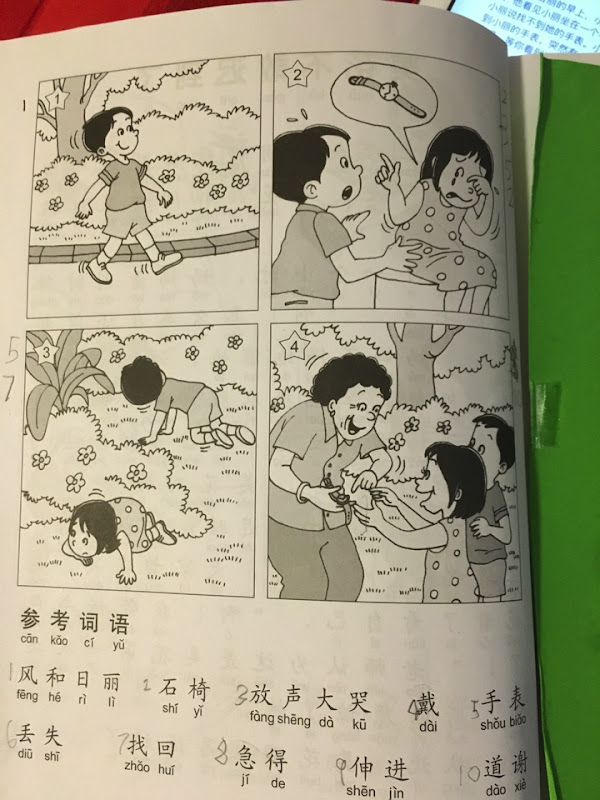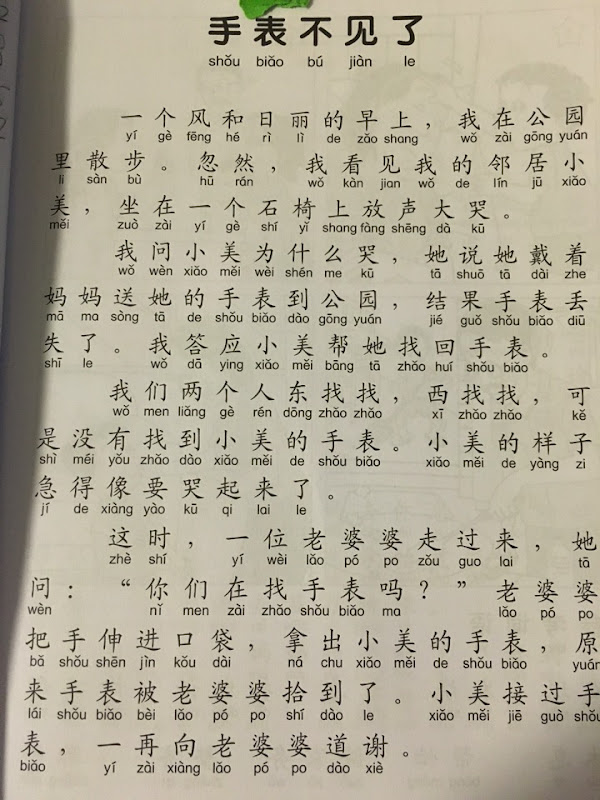Date: Sep 30, 2015
It’s Chinese composition time.
Remember, the more you practice, the more you will command the language and composition.

Perhaps it is the weakest subject for some P3 students. So, these blogs is to help out some parents and share with them how I teach Jay to do his Chinese composition.

This week, I picked this topic. As I recalled the last topic is also some one looking for something, and the two kids help the old lady find something. So, this is a continuation of that topic.

This week, I adopt another new strategy.
1. I now asked Jay to write 2 times. First time is the draft he did without my help. Second draft is the one I explained to him why he cannot write this and that, and ask him to review and write a second draft just below the first draft.
2. I asked him not to erase the first draft so that when he do the second draft, he can easily refer back to the first draft and read it out to the dictation program in iPad. I want him to learn how to think and how to correctly describe what on his mind.
3. I added in timer. For coming out with the first draft, he has 10 minutes to look at the picture, and write down some notes what he want to say. Then, another 10 minutes for the dictation to “speak” out his composition. In real life, they will need 20-30min to write the composition. So, he has to be trained to think fast. As you can see, he has not finished the last sentence and he has to go Taekwondo class already. And you can see he also pronounce not so accurately in the last sentence. So, it does not matter, the challenge for him to quickly conceptualise the story.
I must say, he did pretty well. Except of the last sentence.
===== Let’s look at the two compositions and point out the obvious mistakes =====
a. I don’t like he write “他开开心心的走的时候…“ as it is like purposely write more things to lengthen the composition. So, I taught him must always use “突然”, then, 小明 saw 小丽.
b. Every one only got one butt. So, the butt sit “on” the chair. Why he has to say “坐在一个石椅上”. There is no need to mention she sat on “one” chair and cried loudly.
c. There is a different of saying 小丽 cannot find her watch Vs. 小丽 “lost” her watch. When you say she lost her watch, you don’t know where she lost it. When you say “she cannot find her watch” always imply that she actually know where is the watch, but she cannot find it. In this picture context, using the word “lost” is more relevant here.
d. In the original draft, 小明 saw 小丽 sat on one stone chair, and she is crying very loudly. 小明 "saw already” and he go and ask 小丽 what happen? This sentence seems to long. So, I teach him how to “summarise” it into 小明 saw 小丽 sat on the stone chair and cries loudly. 小明 ask 小丽 what had happen? Which is much shorter and makes more sense.
e. Don’t always use so many 突然. Sometimes, you can add the time element in there, use 不一会儿.
f. Cannot use “奶奶”. Must use 老太太 or 老婆婆. Usually 奶奶 is referring to your grandma.
g. 小丽高兴的说... I told him, it was sad that she lost her watch. But when the old lady found her watch, she should be “happy!” with the exclamation. Very important, in every composition, you must have 1 or 2 times describing the 心情 expression. Is she happy? or sad.
h. This story has no conclusion. There is no right or wrong. But there is happy or sad. So, as long as you concluded the story with very happily go home, it will be enough.

I am very happy about him this week coming up with this composition. He is just learning how to write composition this year. And he is only P3.
Well done Jay. I think another 1-2 weeks, he is ready for taking the MT Paper 1.

There is a reason I covered the page beside.

Now, let’s see what is the modal answer.
WOW… speechless.
Remember, P3 only need to write 80 words.
You can see how many words in the first draft.
写多错多 … write more wrong more.
Just write around 100-120 words will do.

Well done Jay Jay!!


No comments:
Post a Comment